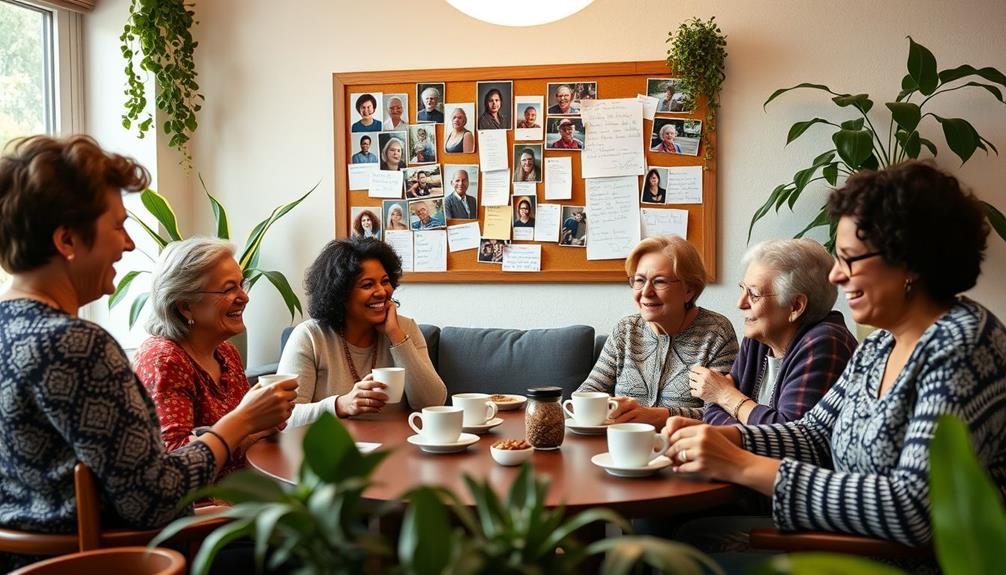Celebrating small victories is crucial for caregivers. It boosts your morale and combats feelings of isolation and overwhelm. Every little achievement, like a successful communication moment or minor improvement in mobility, should be acknowledged. Keeping a gratitude journal or creating visual reminders to track these moments can enhance your emotional resilience and strengthen your connection with those you care for. By focusing on the positive, you can turn challenges into joys. There’s so much more to discover on this rewarding journey ahead.
Key Takeaways
- Acknowledge and document small victories daily to boost morale and maintain a positive outlook in the caregiving journey.
- Celebrate achievements with gratitude journals or visual reminders to reinforce meaningful impacts and strengthen emotional connections.
- Share experiences in support groups to foster community, combat isolation, and celebrate collective progress with fellow caregivers.
- Reframe challenges as opportunities for growth, focusing on improved communication and mobility as milestones worth celebrating.
- Prioritize self-care practices, recognizing that personal well-being enhances emotional resilience and overall satisfaction in caregiving roles.
The Caregiver's Role

As a caregiver, you step into an essential role that goes beyond just providing physical assistance. Your presence offers emotional support, ensuring that those you care for feel valued and understood. Throughout your caregiving journey, you develop a unique bond that enriches both your life and theirs. You learn to navigate the complexities of feelings, balancing empathy and patience while adapting to changing needs.
Caregivers often face challenges, but it's important to maintain a positive mindset. By focusing on the small victories, you can find joy in the journey. Each milestone—whether it's a smile, a shared laugh, or a moment of connection—serves as a reminder of the meaningful impact you have. Celebrating these moments not only boosts your motivation but also reinforces the significance of your role.
Remember that self-care is essential too. Caring for yourself allows you to recharge and maintain the emotional resilience necessary to support your loved ones effectively.
Embrace your caregiving journey, and don't forget to celebrate those small victories that bring joy and fulfillment to your days. Your dedication creates a nurturing environment, making a lasting difference in the lives of those you care for.
Emotional Challenges of Caregiving

As a caregiver, you're likely facing an emotional toll that can feel overwhelming at times.
The stress of managing your loved one's needs may exacerbate feelings of anxiety and depression, which can mirror some of the emotional dysregulation seen in individuals with Borderline Personality Disorder.
You might find yourself grappling with feelings of guilt and isolation while trying to balance your loved one's needs with your own well-being.
Acknowledging these challenges is essential for steering this journey and ensuring you can provide the best care possible.
Emotional Toll on Caregivers
The emotional toll of caregiving can be overwhelming, pulling you into a complex landscape filled with love and compassion, yet shadowed by frustration, burnout, and guilt. You may find yourself on an emotional rollercoaster, where profound joy from small victories often clashes with feelings of isolation and helplessness.
The demands of your role can weigh heavily, leading to high stress levels, and research shows that about 40% of caregivers experience these exhausting feelings. Just as with managing chronic conditions, caregivers must also be mindful of their own health, considering strategies like the significance of self-care to help navigate these emotional challenges.
As you balance caregiving responsibilities with personal obligations, it's easy to neglect your own mental and emotional well-being. This neglect can hinder your ability to provide quality care, making it essential to acknowledge these challenges.
Remember, seeking support when needed isn't a sign of weakness; it's a critical step toward maintaining your health.
You deserve to celebrate the small victories, whether it's a moment of laughter shared or a task accomplished. These moments can provide a much-needed respite from the emotional strain.
Navigating Feelings of Guilt
Managing feelings of guilt is a common struggle for caregivers, often leaving you torn between your own needs and the demands of your loved one. You might feel guilty for taking time for self-care, believing you should be entirely focused on caregiving.
However, prioritizing self-care is essential for your emotional well-being. Research shows that when you acknowledge your feelings of guilt, you can reduce stress and foster resilience in your caregiving role. Understanding the importance of financial considerations for elderly care can also alleviate some burdens, allowing you to focus on your own needs without added stress.
It's important to recognize that guilt is a natural part of the caregiving experience. Instead of letting it weigh you down, try to reframe it. Celebrate small victories in your journey, whether that's completing a task or simply taking a moment for yourself.
Connecting with support groups can also help; sharing your experiences with others in similar situations can alleviate feelings of isolation and provide valuable coping strategies.
Overcoming Isolation and Loneliness
Many caregivers face overwhelming feelings of isolation and loneliness, with studies showing that nearly 40% report experiencing these emotions.
These feelings often stem from the demanding nature of caregiving, leading to stress and withdrawal from social interactions. To combat loneliness and foster a sense of community, consider these three strategies: Understanding the importance of a solid budget can help caregivers manage financial stressors that contribute to feelings of isolation.
- Join Support Groups: Whether in-person or online, support groups create a space where you can connect with others who understand your journey, sharing experiences and victories.
- Schedule Regular Social Interactions: Make it a priority to maintain connections with friends and family, even if it's just a quick phone call or coffee date. These small moments can bring immense joy and help combat isolation.
- Practice Self-Care: Recognize the importance of taking time for yourself. Engaging in activities you enjoy can renew your energy and perspective, making the caregiving experience more fulfilling.
Recognizing Small Victories

Recognizing small victories in your caregiving journey is vital for boosting your morale and maintaining a positive outlook.
Celebrating daily achievements, whether it's a heartfelt thank you or reaching a minor health goal, can foster emotional growth and resilience, reflecting the importance of key domains of development.
Importance of Acknowledgment
Celebrating Small Victories: Finding Joy in the Caregiving Journey
Importance of Acknowledgment (Recognizing Small Victories)
Caregivers' journeys are often filled with challenges, but acknowledging small victories can transform the way you perceive those daily struggles. Celebrating these small wins not only boosts your morale but also reinforces a positive mindset, leading to personal growth and enhanced emotional well-being.
Incorporating elements of music therapy integration into your caregiving routine can further enhance this process, as engaging in calming music or music-making activities fosters creativity and self-expression.
Here are three ways recognizing small victories can create a positive impact on your caregiving experience:
- Boosts Self-Esteem: Each acknowledgment of a small victory, like your loved one completing a personal care task, helps enhance your self-esteem and motivation.
- Fosters Resilience: Celebrating moments of joy allows you to maintain perspective on your journey, making it easier to face challenges with renewed strength.
- Strengthens Connections: Recognizing these achievements promotes a culture of appreciation, benefiting both you and those you support, and enhancing emotional connections in your caregiving relationship.
Consider sharing your victories in a caregiver support group or documenting them in a journal. This practice not only reinforces your importance but also reminds you of the meaningful impact you have on those you care for.
Daily Celebration Practices
Acknowledging small victories is just the beginning of cultivating a joyful caregiving experience. To truly embrace this mindset, incorporate daily celebration practices into your routine. Start by keeping a gratitude journal, where you jot down at least one small win each day. This simple act helps foster a positive mindset, reminding you to focus on the joyful moments rather than the challenges.
Additionally, consider reflecting on the impact of your caregiving through heartfelt expressions of love, which can deepen your sense of purpose and connection in this journey emotional reflections on love.
Consider sharing your small victories with friends or support groups. This creates a sense of community, validating your progress and reinforcing the importance of each step in your caregiving journey. Implementing a short reflection ritual each evening can also enhance mindfulness, allowing you to appreciate the accomplishments of the day.
Visual reminders, like charts or vision boards, can serve as motivational tools, encouraging you to track and celebrate the small victories.
Finally, remember to reward yourself for achieving these milestones. Whether it's treating yourself to a favorite snack or indulging in a relaxing activity, these rewards boost self-esteem and strengthen your commitment to caregiving.
Visualize Progress Effectively
Visualizing your progress is a powerful way to reinforce the small victories you achieve each day in caregiving. By implementing effective strategies for finding and appreciating the small achievements, you can cultivate a more positive mindset.
Incorporating calming essential oils, such as lavender oil known for its soothing effects, can also enhance your emotional well-being during this journey.
Here are some methods to visualize progress effectively:
- Visual Aids: Use charts or graphs to track your daily successes. This tangible representation makes it easier to see advancements over time.
- Milestone Documentation: Take photos or videos of important moments. This visual timeline captures the journey and highlights shared experiences that matter.
- Journaling: Maintain a journal to record your daily victories and emotions. Reflecting on these entries can remind you of the positive aspects of your caregiving role.
Regularly reviewing these visual reminders can notably boost your morale and help you recognize the impact you're making.
Importance of Self-Care

Taking care of yourself is essential if you want to be an effective caregiver. Prioritizing self-care isn't just a luxury; it's a necessity for maintaining your emotional well-being. Incorporating practices like yoga can be particularly beneficial, as it not only promotes physical health but also offers yoga for back pain relief through gentle stretching and mindfulness.
When you engage in regular self-care activities, like exercise or mindfulness practices, you boost your mood through the release of endorphins, leading to a more positive outlook. Remember, even small breaks or simple hobbies can make a significant difference.
Research shows that caregivers who focus on self-care report higher life satisfaction and lower levels of anxiety and depression. This isn't just about your health; it's about being present for your family members.
When you manage your stress and prevent burnout, you're better equipped to handle the deep emotional challenges that caregiving often brings.
Strategies for Joyful Caregiving

In the journey of caregiving, finding joy amidst challenges is essential for both your well-being and the quality of care you provide. Importantly, the power of imagination can enhance creativity and help you envision better outcomes for your caregiving role.
Here are some practical strategies to help you embrace the challenges and make your caregiving journey worthwhile:
- Set Realistic Goals: Break larger objectives into smaller, attainable tasks. Celebrate each small victory to boost your morale and motivation.
- Engage in Self-Care: Dedicate time to hobbies or mindfulness activities. These simple acts can enhance your emotional resilience, helping you find joy in your daily routine.
- Keep a Journal: Document your daily accomplishments to foster a sense of achievement. Reflecting on positive experiences reinforces the joy associated with caregiving.
Sharing your successes with friends, family, or caregiving communities amplifies that joy and provides validation.
Additionally, consider using visual reminders like charts or vision boards to maintain focus on your progress. By actively engaging in these strategies, you can cultivate a positive mindset and celebrate the small victories that make your caregiving journey fulfilling.
Building a Support Network

Finding joy in caregiving often hinges on the connections you foster with others. Building a support network can help us combat feelings of isolation and provide the emotional validation that comes from shared experiences with others who understand your journey.
Whether you engage in online forums or local support groups, these spaces allow you to exchange tips, resources, and encouragement, which can greatly enhance your coping strategies.
When you connect with peers, you're likely to report lower stress levels and increased feelings of belonging, boosting your emotional well-being. Establishing friendships within these caregiving communities can provide ongoing comfort and advice, helping you build confidence during challenging times.
Celebrate the collective victories within your network, as this reinforces the power of small achievements and highlights teamwork in reaching your caregiving goals.
Celebrating Progress Together

Celebrating progress together creates a powerful sense of connection that enriches both caregivers and their care recipients. When you acknowledge small victories as shared achievements, you foster a strong emotional bond that enhances trust and communication. This makes both of you feel valued and understood, creating a supportive atmosphere where you can thrive.
Here are three effective ways to celebrate progress together:
- Create a scrapbook: Document accomplishments, no matter how minor, to visually showcase your journey. This tangible reminder can uplift spirits.
- Share moments of joy: Dedicate time to reflect on recent successes, reinforcing the positivity in your relationship. These conversations can boost morale and motivation.
- Plan a small celebration: Organize a simple event, like a favorite meal or an outing, to honor your progress. This shared experience deepens your emotional connection.
Celebrating progress not only nurtures your bond but also empowers both of you. By focusing on these small victories, you can cultivate a sense of teamwork, encouraging emotional well-being on this caregiving journey.
Transforming Challenges Into Joy

Amidst the daily hurdles of caregiving, transforming challenges into joy can feel like an intimidating task, yet it's a powerful approach that can shift your perspective. By reframing difficult situations as opportunities for growth, you can foster resilience and find meaning in your experiences. Celebrating small victories, like improved communication or mobility, enhances your sense of fulfillment and motivation. Engaging with community support or even drawing inspiration from celebrity stories of caregiving can remind you that you’re not alone in your journey. Many well-known figures have shared their personal caregiving challenges, demonstrating that both heartache and triumph are universal. Learning from their experiences can provide comfort, perspective, and practical tips to navigate your own path with grace and optimism.
To support your emotional well-being, consider documenting moments of joy. This practice helps you focus on the positives and reinforces a positive mindset amidst adversity. Building connections with fellow caregivers can also be invaluable. Sharing experiences and encouragement makes maneuvering challenges easier and creates a sense of community.
Here's a simple guide to help you transform challenges into joy:
| Challenge | Joyful Reframe |
|---|---|
| Communication barriers | Celebrating successful attempts |
| Physical limitations | Acknowledging progress in mobility |
| Emotional exhaustion | Finding strength in shared experiences |
| Feeling overwhelmed | Embracing imperfection and individual timelines |
Frequently Asked Questions
What Are the Joys of Being a Caregiver?
As a caregiver, you experience profound joy through deep connections, shared laughter, and witnessing your loved one's growth. These moments of happiness enrich your life, reminding you of the purpose and fulfillment your role brings.
How Do You Show Appreciation to Caregivers?
To show appreciation to caregivers, you can lend a hand or offer kind words. A simple thank-you note or helping with chores goes a long way. After all, a little kindness can make a big difference.
What Is the Biggest Reward of Being a Caregiver Parent?
The biggest reward of being a caregiver parent is the deep bond you form with your child. You experience profound love and connection, witnessing their growth and milestones, which fills you with purpose and fulfillment.
Conclusion
In your caregiving journey, celebrating small victories can make a world of difference. Did you know that caregivers who acknowledge these moments report a 30% decrease in stress levels? By prioritizing self-care and building a strong support network, you not only nurture yourself but also enhance the well-being of those you care for. Embrace the joy in each step forward, and remember, it's the little wins that can transform challenges into meaningful moments of happiness.









